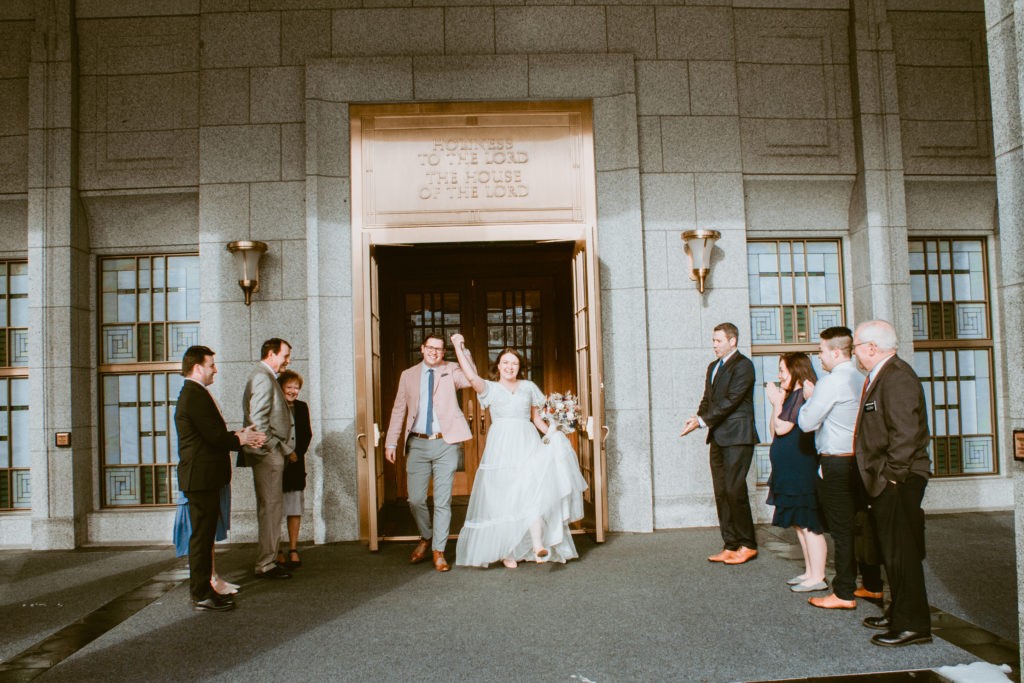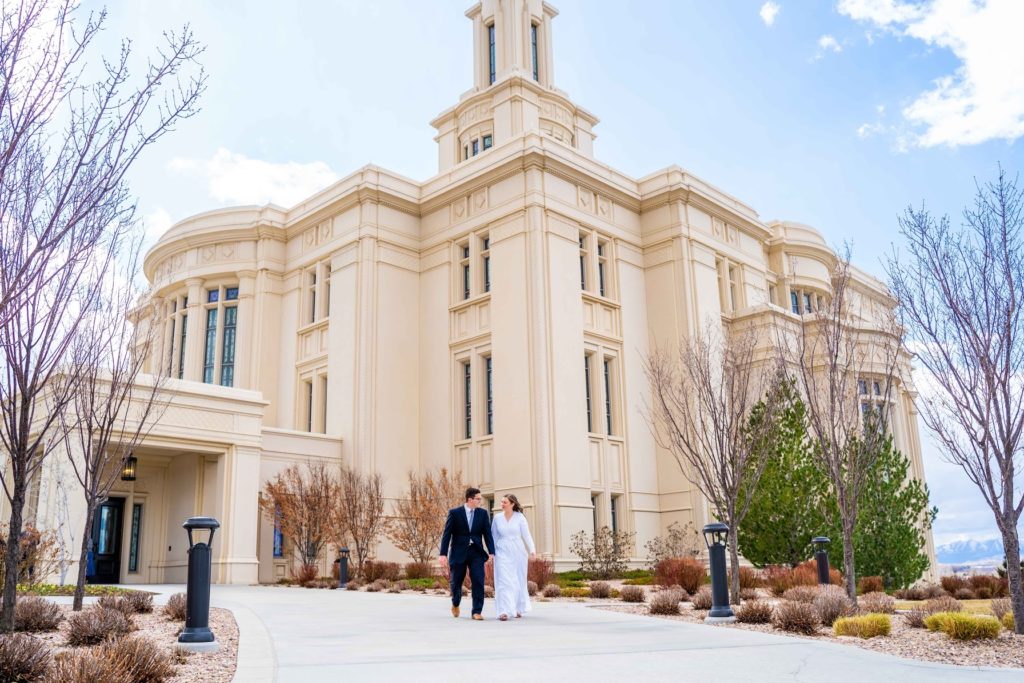
BYU student Rachel Ballard never cared about having an extravagant wedding. However, that didn’t make it hurt any less when the COVID-19 pandemic upended her plans and she had to cut her guest list down from 50 to just eight people in a matter of hours.
Many young couples planning to be married over the last year faced challenging circumstances because of COVID-19. Some of those couples had something unique at their wedding and said they would change very little about their pandemic weddings.
Since Rachel Ballard is from Utah and her husband, Tanner, is from Minnesota, they had many family members traveling to Draper for their wedding on March 21, 2020. They were grateful they didn’t have to change their wedding day, but they did have to cancel their reception last minute.
Unlike the Ballards, there were many couples who had to change their wedding or temple sealing date. One of the biggest hurdles for members of The Church of Jesus Christ of Latter-day Saints wanting to get married during the pandemic was scheduling a temple sealing.
Temple sealer and former temple presidency member David Bean from Provo explained that a temple sealing is more than just a marriage ceremony. Rather, a temple sealing is an ordinance that members of the Church make to progress on the covenant path.
Canceled temple sealings
On March 13, 2020, the Church announced a stop to all proxy ordinances and that only those with an appointment would be able to do live ordinances. Just nine days later on March 23, the first person in Utah died from COVID-19 after attending the Bountiful Utah Temple. The Church then announced the closure of all temples worldwide on March 25, canceling many weddings and other Church ordinances.

San Diego natives and BYU students Audrey and Jacob Ahlstrom found themselves having their sealing date canceled and rescheduled multiple times as the San Diego California Temple opened and closed again throughout 2020. Six weeks after their original sealing date they were married civilly in an intimate wedding ceremony and reception with a limited amount of friends and family.
“My husband and I prioritized having bridesmaids and groomsmen at our wedding. Our friends are especially important to us and we couldn’t have imagined not having them there,” Audrey Ahlstrom said.
They also hosted a drive-by reception for those who could not attend their wedding ceremony. When the San Diego California Temple opened again in September, the Alhstroms decided to drive from Provo to San Diego mid-semester to be sealed on that Tuesday.
Civil marriages during the pandemic

Another couple who decided to get married civilly and sealed later was Garrett and Amy Griffin. They chose last minute to get married civilly in Amy’s living room after the temples closed the day before their scheduled sealing.
“We went several months not knowing when we could finally be sealed and also weren’t sure if or when having a reception was a good idea. We just decided that we had to do the best we could given the circumstances and move forward,” Garrett Griffin said. They were later sealed in the Provo City Center Temple after the initial surge of sealings died down.
BYU students Hannah and Aaron Pfost chose to move their wedding from June to April and decided on an elopement instead of a ceremony. Hannah Pfost said they planned the whole wedding in three days and only had seven guests because COVID-19 restrictions were so intense. They were then sealed in the Gilbert Arizona Temple after it opened again for live sealings.
Church policy changes

Before May 2019, these couples would’ve had to wait a full year to be sealed after their civil marriage. However, on May 6, 2019, the First Presidency of The Church of Jesus Christ of Latter-day Saints sent a letter to the leadership of the Church announcing an end to the one-year waiting period.
In the letter, the First Presidency emphasized the importance of the temple sealing while acknowledging that this may not be possible for many couples who don’t live near a temple. The change can also help family members who would feel excluded since they may not be able to enter the temple.
While this policy change was not a direct result of the pandemic, it has allowed hundreds of couples to make the most of the challenging circumstances brought by COVID-19. Bean said he has found no adverse effects that might lessen the spiritual experiences of a temple sealing in the situations outlined by the First Presidency in their letter.
“However, when conditions are right that the couple is able to be sealed in the temple for their marriage, doing so shows a spiritual understanding and faith, which does enhance the spiritual experience of the sealing ceremony,” Bean said.
Downsizing expectations

Similar to the many couples who had their plans uprooted by the COVID-19 pandemic, Tatum Sammons and Garrett Jensen changed their wedding plans many times. They had originally planned to be married and sealed in the Laie Hawaii Temple, which is the city where they met.
Instead of flying to Hawaii or opting for a civil ceremony, Sammons and Jensen were married and sealed in the Provo Utah Temple when their families found themselves by chance in the state at the same time.
“At one point last year both of our families ended up in Utah unexpectedly and they were both planning on being there for at least two months so we decided and felt that it was the right time and place to get sealed,” Sammons said.
With a loosely Ratatouille-themed reception and a surprise flash mob band, Sammons said their reception was an interesting mix of family and friends that wouldn’t have been able to come had it not been hosted in Utah.
Planning a pandemic wedding

Cale Kimball & Annie Hutton 
James McKenzie and Emma O’Barr
Since the pandemic is not yet over, there are still many couples planning weddings with COVID-19 restrictions in place. BYU students and Dallas natives Annie Hutton and Cale Kimball chose to have an eight-month engagement in hopes that some of the restrictions in place would be lifted.
While more temples are now open for sealings, Hutton said it was still tough to find a temple that had time available on the day they were hoping to be married. They talked to three or four temples before finding an availability at the Jordan River Utah Temple.
Hutton also said COVID-19 vaccines played a small role in them feeling comfortable having a reception with a small guest list. She said they would also be hosting an outdoor reception in their hometown with mask requirements to keep everyone safe.
For James McKenzie and his wife Emma O’Barr, the biggest expectation change was to limit the number of people allowed at their temple sealing and reception. While McKenzie said he was personally glad a few of their guests would be vaccinated, vaccines did not play a role in their decision to have a reception.
Even though there were many challenges for young couples planning and having their weddings this past year, these pandemic-related challenges have led to unique experiences these couples will have to share and cherish forever.




